Featured Student: Kwan Ki (Jerry) Wong
September 11, 2025

September 11, 2025

I’m pursuing my Bachelor of Science with a combined major in Oceanography and Biology, with a minor in Urban Studies. I expect to graduate in May 2026.
The Co-op program is one of the best ways to gain exposure and experience with the real-world job market, as well as discover fields of work that I could be interested in.
I saw the value and quality of the jobs that the Co-op job board provided. Oftentimes, those jobs were not advertised elsewhere, as employers in specialized fields looked for students who demonstrated readiness and eagerness to gain work experience.
Along with the support and tools provided by the Co-op office, I found the program an important complement to my studies and worth delaying my graduation date by a year. On my placement, not only was I able to apply a wide range of skills and knowledge from coursework and teaching labs, but I also underwent significant training in niche field projects such as single-cell research, spatial omics research, fish culture, physiology and dissection, as well as field experience in rivers and streams.
Last but not least, the Co-op program opened doors to connections and networking opportunities, where I further gained an insightful and critical point of view towards work, my field of research and way of living, as well as problem-solving tactics for various aspects of work and life.
I saw the value and quality of the jobs that the Co-op job board provided. Oftentimes, those jobs were not advertised elsewhere, as employers in specialized fields looked for students who demonstrated readiness and eagerness to gain work experience.
Along with the support and tools provided by the Co-op office, I found the program an important complement to my studies and worth delaying my graduation date by a year. On my placement, not only was I able to apply a wide range of skills and knowledge from coursework and teaching labs, but I also underwent significant training in niche field projects such as single-cell research, spatial omics research, fish culture, physiology and dissection, as well as field experience in rivers and streams.
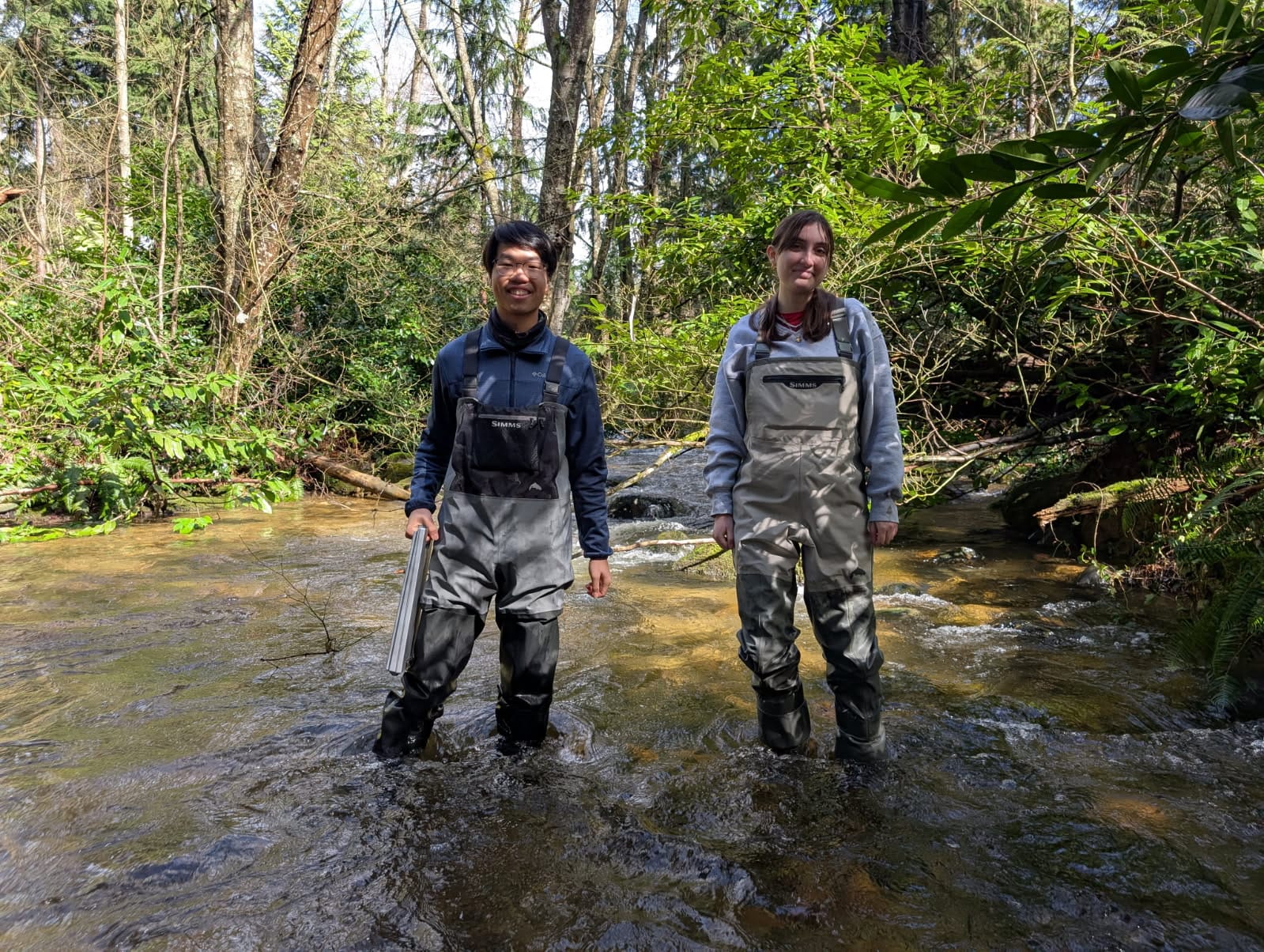
Collecting data with my colleague from loggers installed in streams at North Vancouver.
Last but not least, the Co-op program opened doors to connections and networking opportunities, where I further gained an insightful and critical point of view towards work, my field of research and way of living, as well as problem-solving tactics for various aspects of work and life.
Overall, the Co-op program created a great segue from academia to lifelong working and living experiences for myself. The Co-op office as support—and employers and supervisors as mentors—facilitated a holistic capacity-building experience.
I started off my first six months of Co-op as a Research Assistant at the Laboratory of Imagenomics at the Genome Institute of Singapore under the Agency of Science, Technology and Research (A*STAR) in Singapore. I gained a significant amount of knowledge and skills in molecular biology, genetics and operating microscopes from this placement through both wet and dry lab experience.
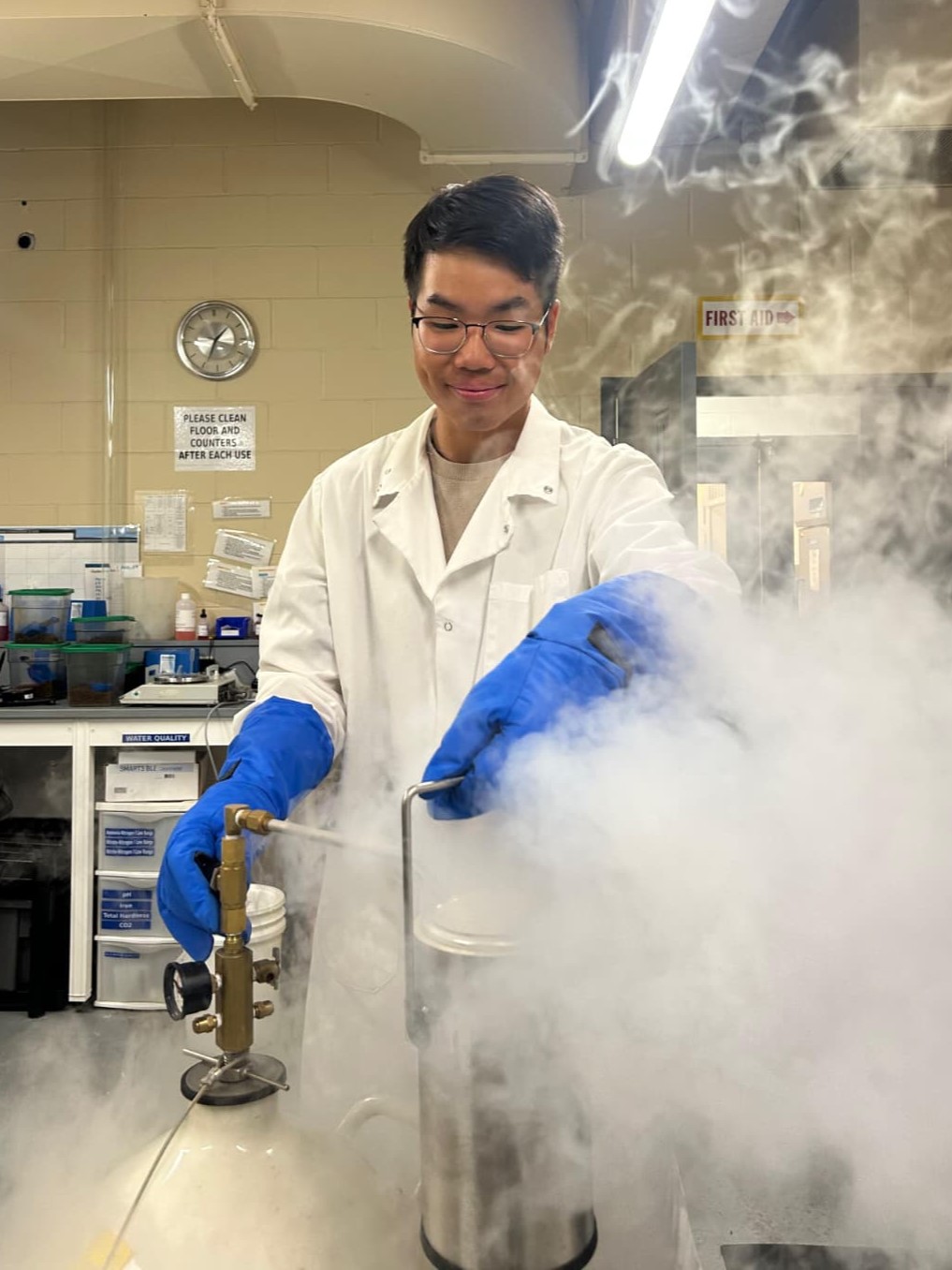
Preparing liquid nitrogen for fish sampling event at the DFO wet lab.
Then, I returned to Vancouver and worked as an Aquatic Science Technician at the Fisheries and Oceans Canada (DFO) Science Branch for the Aquaculture Monitoring Program, Ecotoxicology Program, as well as the Community Stream Monitoring Program in the spring of 2025 at the Pacific Science Enterprise Centre (PSEC).
Later, I transitioned into working as the technician for the Nutrition Analytical Lab and some of the previously mentioned programs in the summer of 2025. The months-long experience provided invaluable immersion into DFO Science’s projects that focus on fishery and environmental monitoring to inform decision making, as well as track the health and physiology of salmonids in fresh and salt water.
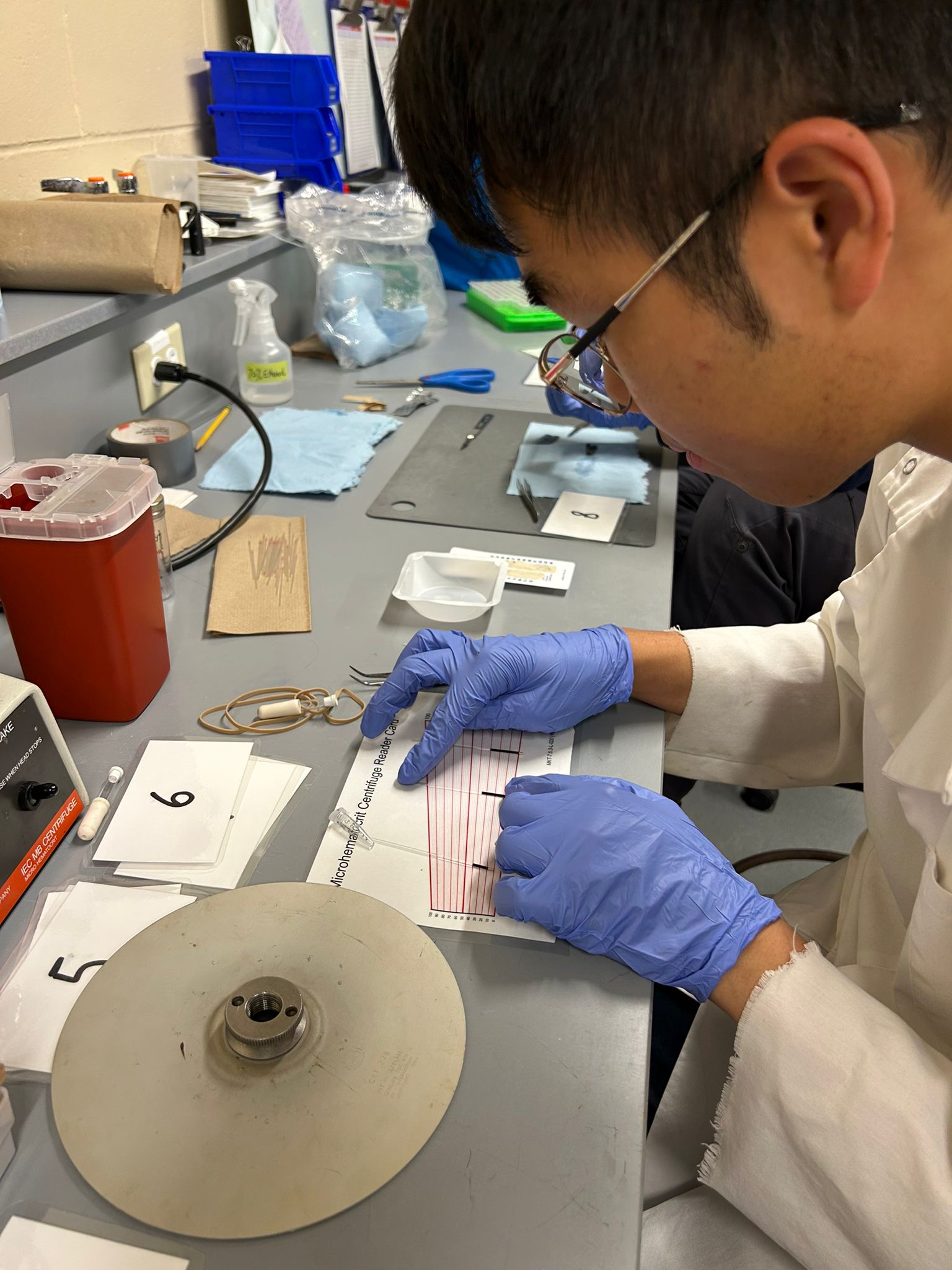
Measuring hematocrit values from blood samples collected on Chinook Salmon at DFO.
I enjoyed the small moments and connections.
One of my favourite experiences in Co-op was meeting passionate and like-minded individuals from all around the world during my placements. As much as I found joy in the work I do, I enjoyed the conversations with colleagues and other interns at pantries and during lunch hours.
Whether it’s about their projects, life stories or something fun and cool that they got to experience, the connections formed are both unmatched and irreplaceable. The stories shared and the exchange in conversations led to new opportunities and sparked exciting ideas invaluable for career and personal growth.
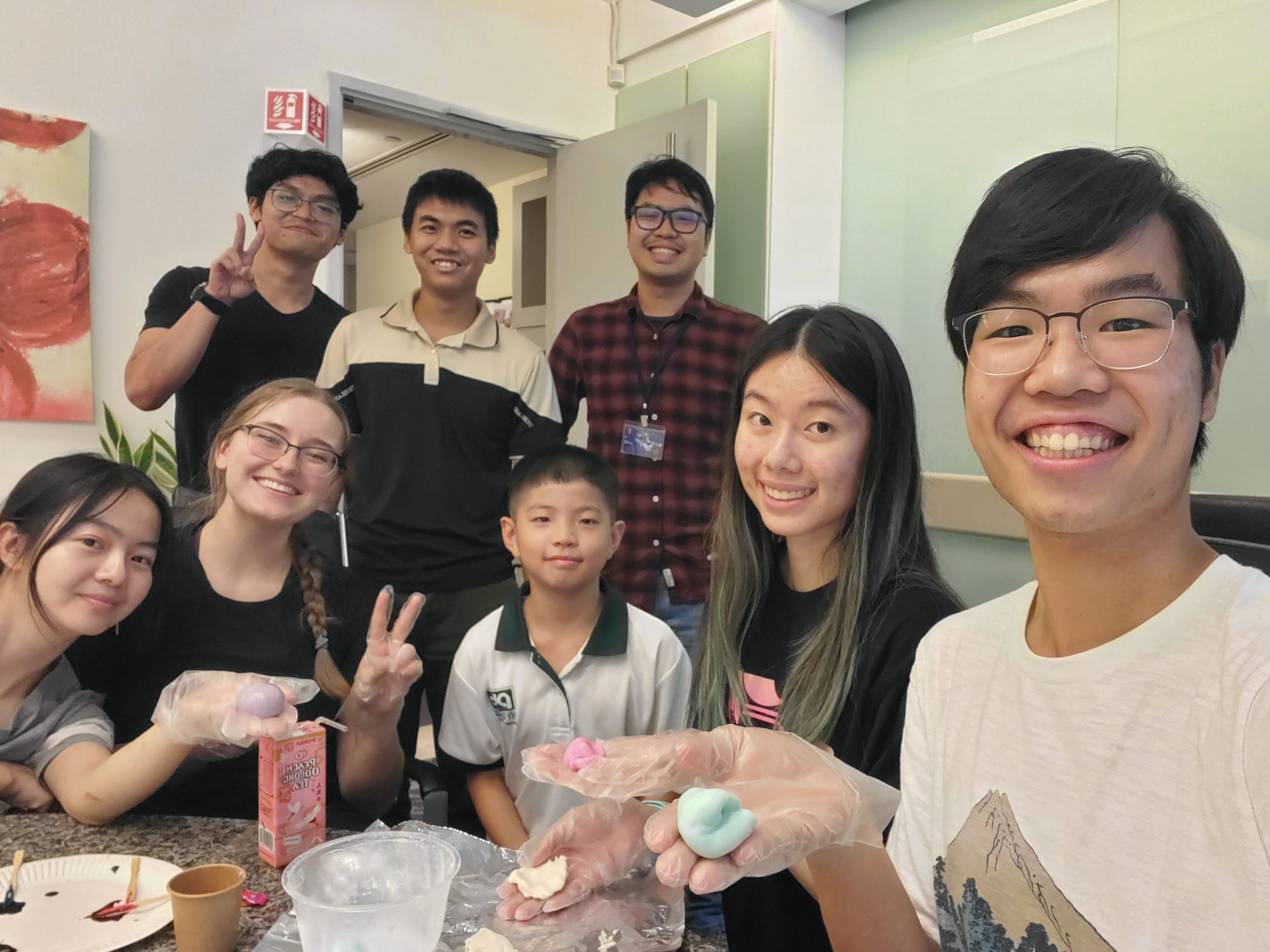
Snapshot of mooncake making with other intern friends during the Mid-Autumn Festival event at the Genome Institute of Singapore.
I’ve been involved in several projects throughout my Co-op placements.
Out of all of the projects combined, my best achievement was harnessing the essences of resilience, flexibility and patience.
A supervisor told me key notes to remember: research was a game of problem solving and there was no one correct way to find the results or the answer. Practice caution—no one step should be done blindly, yet all one needed to progress was to try: test with basis and hypothesis.
I held onto those thoughts and carried them forward with passion and perseverance, as I encountered troughs and difficulties. I sought second opinions, tested new methods, paced myself step-by-step, took pauses to identify problems and recalibrated—all crucial to the journey.
A supervisor told me key notes to remember: research was a game of problem solving and there was no one correct way to find the results or the answer. Practice caution—no one step should be done blindly, yet all one needed to progress was to try: test with basis and hypothesis.
I held onto those thoughts and carried them forward with passion and perseverance, as I encountered troughs and difficulties. I sought second opinions, tested new methods, paced myself step-by-step, took pauses to identify problems and recalibrated—all crucial to the journey.
With all of those combined, I believe that progress with resilience and change in mind was my best achievement.
My best days in Singapore were after a long day of work—running samples on the microscope and analyzing data, friends from my lab, as well as other labs, would get together for dinner and dessert to wind down for the day.
Sometimes, we would spice up the after-hours with a weekend getaway to nearby Asian countries, where we enjoyed local parks and recreational spaces, unbeatable hawker centre food, fireworks after parades, night safaris and many other festivities.
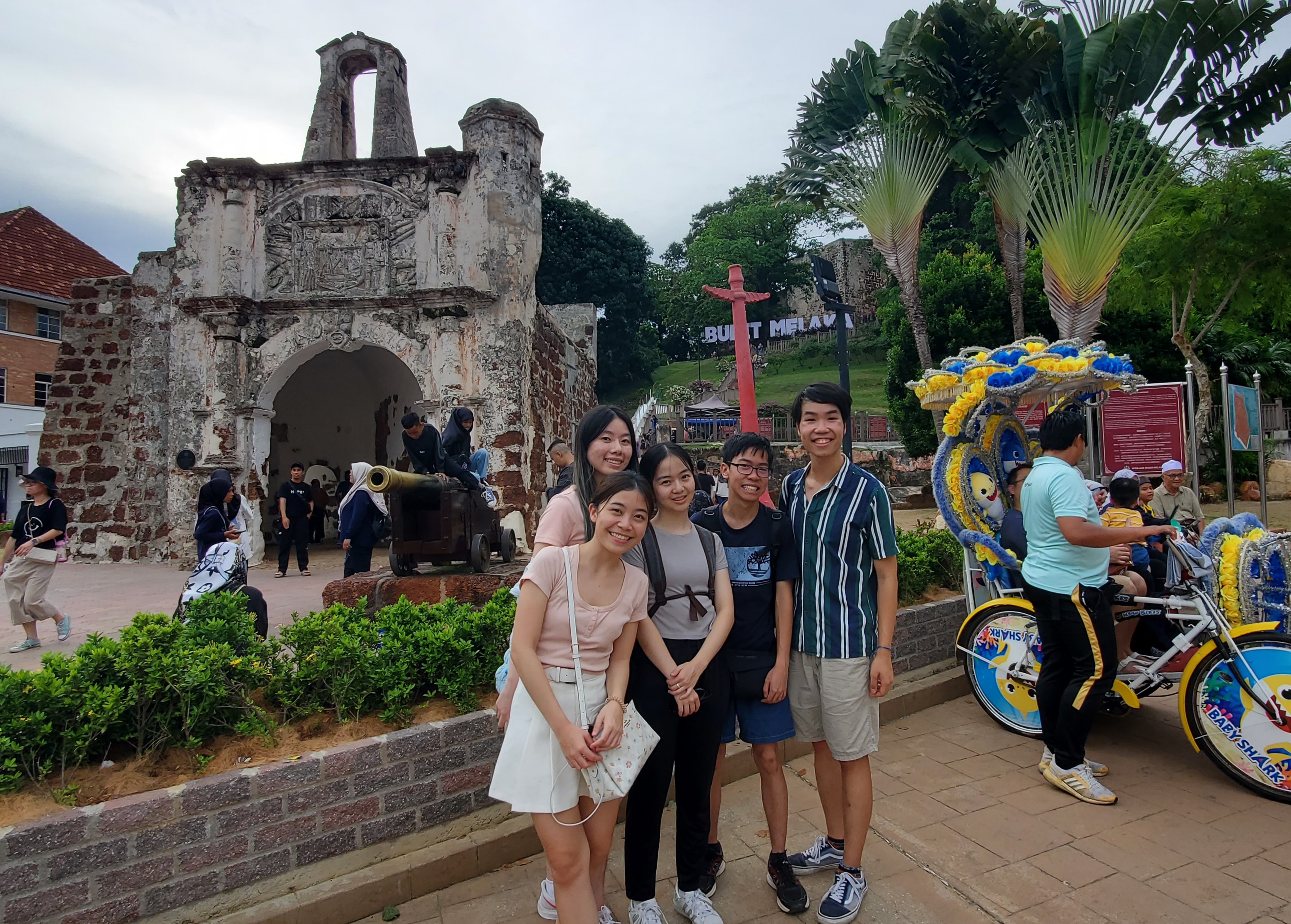
Excursion to Malacca, Malaysia with friends I met at the lab internship in Singapore.
My best days in Vancouver during Co-op started with a long commute to work with a great view of the North Shore and Burrard Inlet, as I crossed the Lions Gate Bridge. Then, productivity at sampling events, the lab or out at streams, before joining lunch with colleagues under sunshine at the shoreline—sometimes with wildlife sightings near and afar. I ended the day with a powerful dragon boat practice down at False Creek, spent quality time with friends over dinner or enjoyed a restful evening at home.
As I was heavily involved in scientific research projects for both of my placements, the simple thought of contributing to progress and advancements on projects, and the time that it took to validate a theory or result challenged me.
As I connected with supervisors, colleagues and peers to discuss roadblocks that I faced at a micro level, we took steps together towards progression at a broader scale. I found solace through sourcing multilateral advice from the people around me and translating it into the power of determination, the motivation to stay informed and be prepared, and last but not least, a fearlessness of failure.
One of my supervisors once mentioned that scientific research was almost all about problem-solving and seeking solutions. While it wouldn't be a smooth sail, it was critical to stay positive mentally, continue to exchange knowledge with others and be determined when navigating potential solutions.
One of my supervisors once mentioned that scientific research was almost all about problem-solving and seeking solutions. While it wouldn't be a smooth sail, it was critical to stay positive mentally, continue to exchange knowledge with others and be determined when navigating potential solutions.
Transitioning into Co-op from undergrad studies can be a big change and it certainly was one for me—from job applications to work permit processes, moving to a new country (or resettling back to Vancouver), adapting to new environments or work cultures, growth in responsibilities at work and accountability to myself. The metric to measure growth and achievement was no longer just about grades and comments from instructors. I kept myself on track by forming a balanced life outside of work, enjoying moments with friends and family and maintaining a healthy and active lifestyle—while performing well at work.
Time is relative, yet it is a finite resource, and taking control of my time was one of my most effective ways I found for self-care. When I budgeted my time for tasks at work and planned my days for hangouts and vacations outside of work, I mitigated the fear of the unknown and reduced anxiety from potential mishaps, such as not being able to complete a task at work, shortcomings from lack of fitness or the fear of missing out when exploring new places.
...I always mentally saved some room for unexpected surprises and kept my days somewhat organic and allowed them to flow as they went. By creating buffer time, I could find joy in small moments, even if the day was a wild and unexpected ride.
Realistically speaking, things go unplanned or wrong all the time, so keeping an open mind and unleashing myself to new opportunities lowered my stress by a lot.
Although, ideally everything would go as planned, I always mentally saved some room for unexpected surprises and kept my days somewhat organic and allowed them to flow as they went. By creating buffer time, I could find joy in small moments, even if the day was a wild and unexpected ride. Realistically speaking, things go unplanned or wrong all the time, so keeping an open mind and unleashing myself to new opportunities lowered my stress by a lot.
All in all, I found it crucial to take time for things that I valued, since work was never the only thing in life. Pacing myself outside of work ultimately brought productivity and efficiency at work.
Co-op was a juncture tool that built doors and windows for me to step outside of the bubble of learning and embark on the wild trials of figuring out my own path.
There are many ways to ignite personal growth; Co-op is like a premium subscription to university, an investment that offers unmatched access to industry and real-world challenges.
There are many ways to ignite personal growth; Co-op is like a premium subscription to university, an investment that offers unmatched access to industry and real-world challenges. The hiatus from lecture halls and teaching labs spared time for the experience in solidifying (or rejecting) realistic life goals and drawing a clearer picture of what I do and do not want to be as I soon step out into the world with my bachelor’s degree.
Similar to personal growth, Co-op acted as a bridge from academia to work.
In addition to the skills, techniques and work-learn experiences gained, Co-op was an opportunity to connect with employers and form networks with organizations for future opportunities.
Most importantly, Co-op acted as a gateway for me to explore a variety of work types, which helped me better understand my preferences and the type of career I hope to pursue in the future.
Advice and comments from my Co-op Coordinator have been a critical support along the Co-op journey.
This began with one-on-one résumé and cover letter workshops, where I received targeted feedback for improvement. As I entered my placements, I found strong support through the check-in meetings and email exchanges with my Coordinator as I navigated new environments. Staying connected with the Co-op office and knowing that they are there to support me was the largest comfort that I felt.
My advice is to take on out-of-town positions and gain experience working and living in a new foreign place.
Speaking up and asking questions opens doors to wonders.
Initiate lines of communication and seek improvements in projects and experiments—they're key to new inspirations. Try not to be afraid to open conversations and ask questions, whether it is related to work, projects, things that you're interested in and most importantly: opportunities to get involved and potential future positions. Speaking up and asking questions opens doors to wonders. It will not be a smooth ride, but keep an open and positive mind and it will definitely propel, rather than hinder, your career.
After graduation, I hope to further advance research as a graduate student and researcher in coastal oceanography, with a focus on biological interactions in coastal ecosystems, as well as physical changing ocean dynamics and their effects on coastal urban development and growth.
With my coastal scientific knowledge, I'll target the connection between residents of cities and the ocean, analyzing anthropogenic impacts on marine ecosystems. This will challenge stakeholders to adapt city planning policies that favour marine conservation and health, as well as prepare cities for a changing ocean.
I'll mobilize my knowledge, skills and resources as a budding ocean scientist to inspire citizen science and promote civic engagement, to mitigate and prepare for challenges while fostering a sustainable urban ocean for future generations.
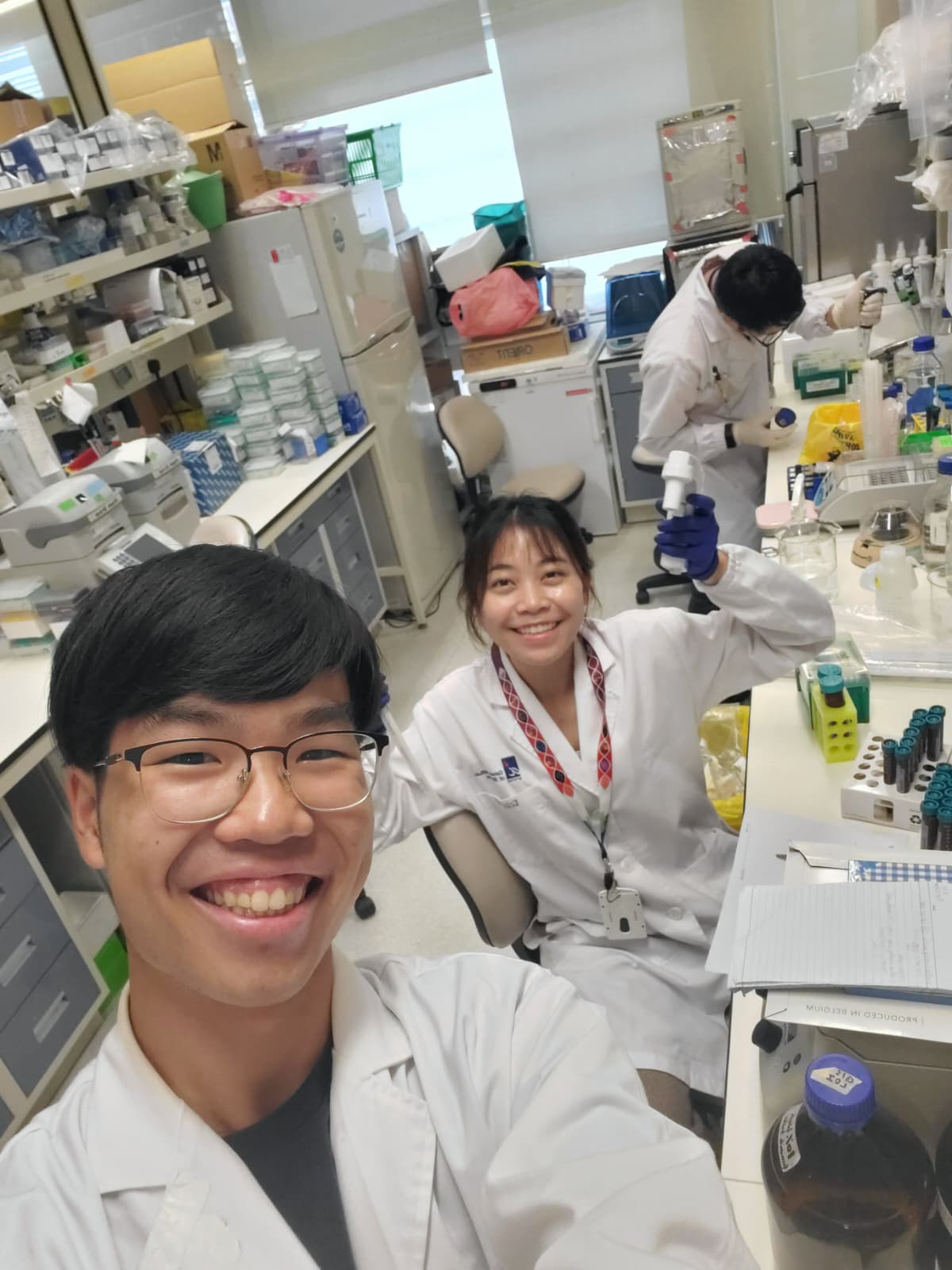
Preparing for experiments at the bench with colleagues in Singapore.
We honour xwməθkwəy̓ əm (Musqueam) on whose ancestral, unceded territory UBC Vancouver is situated. UBC Science is committed to building meaningful relationships with Indigenous peoples so we can advance Reconciliation and ensure traditional ways of knowing enrich our teaching and research.
Learn more: Musqueam First Nation